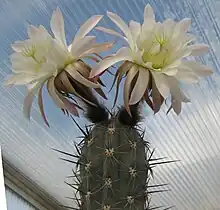Echinopsis tacaquirensis
Echinopsis tacaquirensis, is a species of Echinopsis found in Bolivia.[2]
| Echinopsis tacaquirensis | |
|---|---|
 | |
| Scientific classification | |
| Kingdom: | Plantae |
| Clade: | Tracheophytes |
| Clade: | Angiosperms |
| Clade: | Eudicots |
| Order: | Caryophyllales |
| Family: | Cactaceae |
| Subfamily: | Cactoideae |
| Genus: | Echinopsis |
| Species: | E. tacaquirensis |
| Binomial name | |
| Echinopsis tacaquirensis (Vaupel) Friedrich & G.D. Rowley 1974 | |
Description
Trichocereus tacaquirensis grows as a shrub, branches out from the base with crowded, ascending twigs and reaches heights of growth of up to 2.5 metres. The robust, cylindrical, dark green shoots can reach a diameter of up to 15 centimeters. There are up to nine ribs that are up to 2 centimeters high. The large areoles located on them are white and are up to 1.5 centimeters apart. The spines emerging from them can occasionally not be clearly distinguished into central spines and radial spines. The mostly radiating, white to pink to blackish spines are bristly to needle-like and sometimes intertwined. They have a length 1 of 6 centimeters.
The funnel-shaped flowers are white to pale pink and up to 23 centimeters long. Your flower tube is hairy brown. The dark green fruits have a diameter of up to 4 centimeters.[3]
Distribution
Trichocereus tacaquirensis is found in southern Bolivia at altitudes of 2000 to 3500 meters.
Taxonomy
The first description as Cereus tacaquirensis by Friedrich Vaupel was published in 1916. Curt Backeberg placed the species in the genus Trichocereus in 1959. Another nomenclature synonym is Trichocereus tacaquirensis (Vaupel) Cárdenas ex Backeb.
References
- "The IUCN Red List of Threatened Species". IUCN Red List of Threatened Species. 2010-09-22. Retrieved 2023-08-29.
- "Echinopsis tacaquirensis". Tropicos. Retrieved 2019-08-22.
- Anderson, Edward F.; Eggli, Urs (2005). Das grosse Kakteen-Lexikon (in German). ISBN 3-8001-4573-1.
External links
 Media related to Trichocereus tacaquirensis at Wikimedia Commons
Media related to Trichocereus tacaquirensis at Wikimedia Commons Data related to Echinopsis tacaquirensis at Wikispecies
Data related to Echinopsis tacaquirensis at Wikispecies
